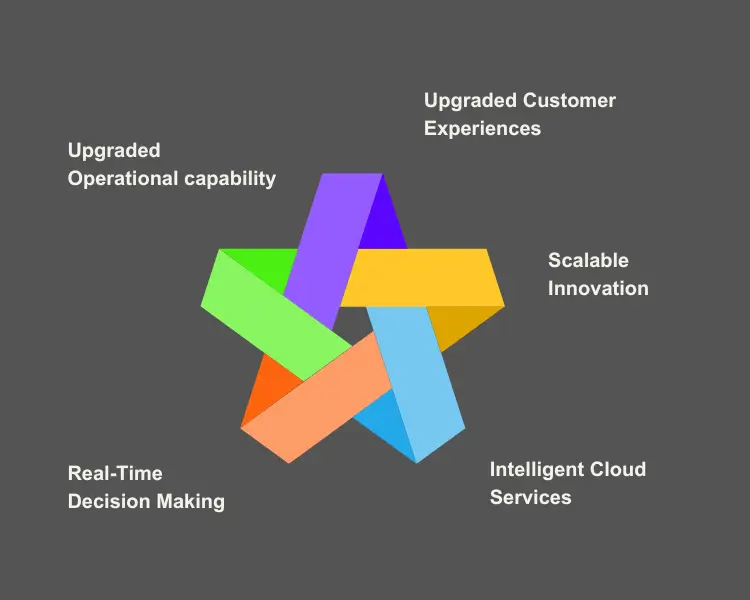Think of having a hyper-intelligent assistant working behind the scenes of your enterprise, AI Powered Cloud Solutions never rests, continually learns, and scales on demand to address your requirements. They’re not buzzwords any longer; they’re actual tools that change due to how companies operate. From optimising operations to delivering personalised customer experiences at scale.
AI alone can analyze and predict, but when it’s powered by the cloud, it becomes accessible anytime, anywhere, with no heavy infrastructure, no massive upfront investments. Whether it’s automating mundane tasks or making smarter decisions from your data, the cloud gives AI the wings it needs to deliver real results.
In today’s fast-moving world, companies that choose early enjoy a serious advantage. However, AI in the cloud is no longer the preserve of tech titans, startups, SMEs, and enterprises too are influencing it to create new value, facilitate innovation, and future-proof growth. Let’s look at how this power couple is changing industries and why the time to join is now.
What are Some Key Tasks That AI Now Automates in Cloud Environments?
Artificial Intelligence is changing cloud operations by automating, optimizing, and personalizing tasks that were once highly labor-intensive. From managing workloads to monitoring infrastructure, AI is making cloud systems more capable and responsive. Also processes like auto-scaling, anomaly detection, and system maintenance are now automated with minimal or no human intervention.
The union of AI and cloud infrastructure allows real-time data processing and decision-making. Enterprises can now examine large datasets in distributed systems and arrive at action-ready insights in real time. The agility is further reshaping the way organizations adapt to internal and external pressures. Companies are becoming more proactive, minimizing downtime, and upgrading user experience.
In addition, cloud AI integration encourages a culture of innovation within IT organizations. By choosing teams from routine work, businesses can divert their efforts toward strategic objectives, experimentation, and innovation. However, developers and engineers have access to scalable environments and smart tools that speed up application development, testing, and deployment all with less operational overhead.
What Benefits Do Businesses Gain From AI Cloud Solutions?
Cloud solutions are not merely technology upgrades; they’re strategic enablers with multi-dimensional advantages for businesses in all sectors. Here’s why:
- Upgraded Operational capability
Automation through AI reduces human intervention in mundane processes. From server load management to storage optimization, intelligent software automates operations and eliminates the chances of human error. This leads to quicker processing and reduced operational expenses. - Real-Time Decision Making
AI’s predictive capabilities allow businesses to make faster, data-backed decisions. Also, cloud platforms process vast data sets in real-time, allowing more accurate forecasting, market responsiveness, and strategic agility. - Upgraded Customer Experiences
By analyzing customer behavior and preferences, AI customise interactions and service delivery. This leads to more personalized experiences across platforms, increasing satisfaction, retention, and brand loyalty. - Scalable Innovation
Cloud-based AI allows firms to innovate and test without having to make huge initial investments in infrastructure. Businesses can even build new services, scale successful services, and move into new markets quickly and with facilitating rapid expansion. - Intelligent Cloud Services
With chatbots to sophisticated analytics software, cloud services allow enterprise capabilities to be upgraded. They provide automated insights, more intelligent operations, and context-rich applications that get smarter by the day.
What is the Cost Impact of Moving AI Workloads To the Cloud?
Moving AI workloads to the cloud brings with it both short- and long-term cost implications that can have a major influence on an organization’s financial and operational planning. Also, cloud-based solutions might seem costly in the first instance, with costs for compute, data storage, and bandwidth use. However, when measured against the total cost of ownership for local infrastructure, the value proposition becomes apparent.
Businesses pay for what they consume, with costs becoming predictable and scalable. This transition from CapEx to OpEx enables enterprises to calibrate costs with performance and growth demands. In addition, cloud providers provide tiered pricing and AI-optimized services, which can minimize cost through automation and smart resource allocation.
Accelerated development cycles, minimized downtime, and increased productivity yield measurable ROI. Also, connecting AI initiatives to an articulated business AI strategy ensures that investment is driving high-impact objectives, upgrading cost-effectiveness and strategic alignment over time.
What is the Impact of AI Cloud Systems on Traditional IT Roles?
The emergence of AI cloud environments is revolutionizing the role and expectations that come with conventional IT positions. As much as fears of automation replacing people usually come into play, the truth is more complex, jobs are changing, not vanishing. Repetitive, mundane tasks like system patching, backup scheduling, and performance monitoring are being automated more and more, allowing IT specialists to concentrate on high-value activities.
This revolution requires a change in skill sets. Instead of being system administrators moving towards being cloud architects, AI operations engineers, and data pipeline managers are upskilling and are becoming career imperatives.
Above all, AI cloud solutions enable IT departments to become business transformation partners. Their work is less focused on “keeping the lights on” and more on leading innovation, facilitating agile development, and delivering intelligent services. The result is a more interested, forward-leaning IT workforce and is mainly focused on digital expansion.
How is AI in the Cloud Transforming Business Intelligence Platforms?
AI-based cloud platforms are changing the process to gain access to, and take action on, business insight. Here’s why:
- Quicker Insight Generation – AI processes big data in real-time, giving near-simultaneous analysis and reporting to enable faster decision-making.
- Predictive Analytics – AI-based models running in the cloud predict future behavior by extrapolating from the past, enabling organizations to anticipate market changes.
- Automated Data Cleansing – AI automation upgrades data quality by identifying and correcting anomalies or inconsistencies without manual intervention.
- Natural Language Querying – BI platforms are integrating NLP features, allowing users to ask questions in plain English and receive clear, contextual insights.
- Dynamic Dashboards – AI tailors dashboards based on user behavior and objectives, upgrading usability and strategic alignment.
- Cross-Platform Integration – Business intelligence solutions based on AI now integrate flawlessly with CRM, ERP, and third-party systems to provide end-to-end perspectives.
Conclusion
Artificial intelligence and cloud computing are converging in a way that’s more than just a technology trend, it’s changing business models and customer experiences. From simplifying IT functions to revealing predictive insights, AI cloud solutions are making enterprises smarter, faster, and more scalable. For innovation, optimization, or growth, AI in the cloud sets new channels for competitive strength.
For companies willing to venture into this new frontier, Revolution AI provides specialized services aimed at tapping into the maximum power of cloud-driven intelligence. Having the depth of knowledge in AI strategy, cloud infrastructure, and data science, we assist organizations with smooth and strategic migration, guaranteeing measurable results and sustainable growth.
Frequently Asked Questions
AI solutions combine artificial intelligence capabilities with cloud infrastructure to automate processes, analyze data, and enable smarter decision-making. Unlike traditional cloud computing, which focuses mainly on storage and compute resources, cloud solutions bring intelligent automation and real-time insights into the mix.
Through tools like chatbots, recommendation engines, and real-time analytics, AI in the cloud helps businesses deliver more personalized and responsive customer experiences. These services learn from user behavior and adapt to offer faster support, tailored suggestions, and predictive solutions.
Yes, major AI cloud platforms invest heavily in advanced security protocols, including data encryption, role-based access, compliance certifications, and threat detection. With proper configuration and governance, businesses can securely manage even sensitive workloads in the cloud.
Industries like healthcare, finance, retail, manufacturing, and logistics are seeing significant gains from AI cloud integration. Use cases range from fraud detection and supply chain optimization to personalized marketing and predictive maintenance.
AI cloud platforms offer on-demand resources and intelligent tools that help businesses scale rapidly without major infrastructure investments. Teams can experiment with new ideas, deploy AI models faster, and adjust capacity as needed—driving continuous innovation.

Hemal Sehgal
Introducing Hemal Sehgal, a talented and accomplished author with a passion for content writing and a specialization in the blockchain industry. With over two years of experience, Hemal Sehgal has established a strong foothold in the writing world, c...read more




